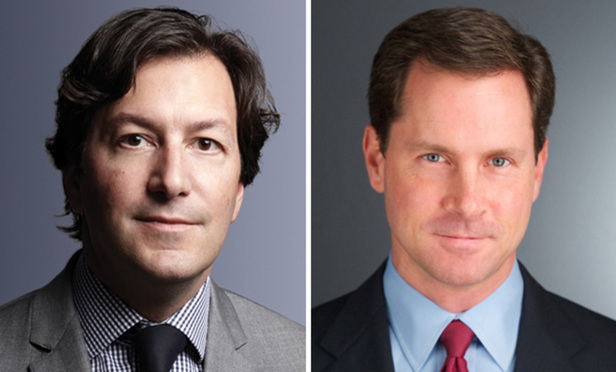Christopher Boehning

December 02, 2019 | New York Law Journal
Court Infers Intentional, Bad Faith Spoliation From Use of Ephemeral MessagingIn their Federal E-Discovery column, Christopher Boehning and Daniel J. Toal discuss the recent case of 'Herzig v. Ark. Found. for Med. Care', which addresses the issue of ephemeral messaging and spoliation. The court there found that the use of the ephemeral messaging app Signal was evidence of bad faith sufficient to warrant sanctions.
By Christopher Boehning and Daniel J. Toal
8 minute read

September 30, 2019 | New York Law Journal
Balancing Privacy and Discovery, Court Allows Forensic Imaging of Personal DevicesIn their Federal E-Discovery column, H. Christopher Boehning and Daniel J. Toal discuss a recent case in which the district judge allowed the forensic imaging of personal devices after finding that a compelling need for discovery outweighed privacy interests. This recent case demonstrates the evolving nature of the balancing process between these competing interests and can serve as a helpful guide to judges who will have to navigate the issue in the future, especially as data privacy laws expand around the world and within the United States.
By H. Christopher Boehning and Daniel J. Toal
7 minute read

August 05, 2019 | New York Law Journal
Third Circuit Grants New Trial To Allow E-Discovery Expert TestimonyIn their Federal E-Discovery column, Christopher Boehning and Daniel J. Toal discuss 'GN Netcom v. Plantronics', which serves as a reminder to parties and practitioners of the key importance of experts—and their testimony—as part of discovery. And, importantly, it also highlights the potential significant impact of insufficient discovery processes on the overall outcome of matters.
By H. Christopher Boehning and Daniel J. Toal
7 minute read

June 03, 2019 | New York Law Journal
Court Provides Guidance on Impact of Document Retention PoliciesIn their Federal E-Discovery column, Christopher Boehning and Daniel J. Toal discuss a recent decision from the District of Maryland which provides some guidance on the issue of whether organizations can be held accountable for lack of compliance with their own document retention policies when information otherwise not subject to a legal data preservation requirement has been lost in contravention of such policies.
By H. Christopher Boehning and Daniel J. Toal
6 minute read

April 01, 2019 | New York Law Journal
'Pearlstein' Offers a Primer on Privilege and WaiverIn their Federal E-Discovery column, H. Christopher Boehning and Daniel Toal write: Privilege and waiver issues can be especially vexing, particularly when amplified in the e‑discovery context. In 'Pearlstein v. Blackberry', Judge Katharine Parker helps unravel some of these issues, presenting what amounts to a primer on these topics.
By H. Christopher Boehning and Daniel J. Toal
7 minute read

February 04, 2019 | New York Law Journal
'Flawed' Legal Hold Warrants Sanctions; New Commentary Provides GuidanceIn their Federal E-Discovery column, H. Christopher Boehning and Daniel J. Toal discuss a recent case that provides an example of a party's “flawed” legal hold that led to a discovery sanction. A newly updated commentary from The Sedona Conference could potentially guide organizations in how to avoid such a situation.
By H. Christopher Boehning and Daniel J. Toal
7 minute read
December 03, 2018 | New York Law Journal
Court Weighs Data Privacy Concerns in Discovery AnalysisIn their Federal E-Discovery column, Christopher Boehning and Daniel J. Toal discuss a decision which provides support for those who want courts to factor data privacy concerns into their determinations of the permissible scope of discovery.
By H. Christopher Boehning and Daniel J. Toal
7 minute read

October 01, 2018 | New York Law Journal
'Deficient TAR Process' Leads to Discovery ExtensionIn their Federal E-Discovery column, H. Christopher Boehning and Daniel J. Toal write: TAR often can make the discovery process faster, less expensive and possibly more accurate, but at times it can fall short at one or all of these objectives. This is especially true in situations where the process part of TAR may be reasonably called into question, as occurred in a recent decision where a party's motion to extend discovery deadlines was granted by a receptive court.
By H. Christopher Boehning & Daniel J. Toal
6 minute read

August 06, 2018 | New York Law Journal
Commentary Provides Guidance on BYOD DiscoveryIn their Federal E-Discovery column, H. Christopher Boehning and Daniel J. Toal write: In 2016, scant direction existed for organizations looking to structure a “Bring Your Own Device” program with e-discovery requirements in mind, and there was even less guidance for courts confronted with requests for discovery of ESI on such devices. That has changed thanks to a new publication from The Sedona Conference.
By Christopher Boehning and Daniel J. Toal
2 minute read

June 04, 2018 | New York Law Journal
CLOUD Act Governs Warrants for Data Stored Outside U.S.Microsoft's four-year legal battle over the U.S. government's ability to subpoena customer email stored outside of the United States ended abruptly thanks to the passage of the Clarifying Lawful Overseas Use of Data Act (CLOUD Act) which directly governs the subject matter. While the CLOUD Act provides clarity as to the permissible reach of the U.S. government, it raises issues of potential conflicts with the laws of other countries.
By Christopher Boehning and Daniel J. Toal
1 minute read
Trending Stories
- 1Call for Nominations: Elite Trial Lawyers 2025
- 2Senate Judiciary Dems Release Report on Supreme Court Ethics
- 3Senate Confirms Last 2 of Biden's California Judicial Nominees
- 4Morrison & Foerster Doles Out Year-End and Special Bonuses, Raises Base Compensation for Associates
- 5Tom Girardi to Surrender to Federal Authorities on Jan. 7
More from ALM
- Scan In Progress: Litigators Leverage AI to Screen Prospective Jurors 1 minute read
- Legal Speak at General Counsel Conference East 2024: Match Group's Katie Dugan & Herrick's Carol Goodman 1 minute read
- Legal Speak at General Counsel Conference East 2024: Eric Wall, Executive VP, Syllo 1 minute read



